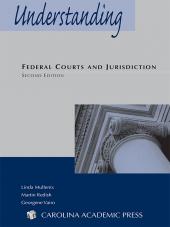The law librarians and library staff at Robert Crown Law Library are here to help you! You can find the latest information about our hours and services on the library homepage. There are several ways to contact us:
Zoom: Drop in to our virtual reference room during our Reference Desk hours to ask any questions.
Make an appointment: Online and in-person appointments with the reference staff can be made from the library homepage.
Email us:
Call us:
There are several resources that aim to provide an introduction to the U.S. legal system, some of which are written for LLMs or foreign lawyers; these books are collected directly below this paragraph. This page also includes resources specific to the federal and state court systems, as well as resources related to the common law, the system of law used in the U.S.
"This book, suitable as a primer for foreign LLMs -- or as an introductory survey for American students of both procedural and substantive law -- is a comprehensive, though concise, survey of the American legal system."
"American Law in a Global Context is an elegant and erudite introduction to the American legal system from a global perspective. It covers the law and lawyering tools taught in the first year of law school."
"American Legal Systems: A Resource and Reference Guide is a reader-friendly introduction to U.S. legal terms, institutions, and sources of law, including a discussion of precedent and the defining principle of stare decisis."
"This text provides an introduction to U.S. law. It is intended for law students, lawyers, and legal scholars from foreign countries; U.S. non-law graduate and undergraduate college students; and anyone else."
"This book is designed to be a general introduction to the structure and function of the legal system of the United States, and is especially useful for those readers who lack familiarity with fundamental establishments and practices."
"Heavily classroom-tested by the authors and other instructors, this powerful teaching tool puts an emphasis on vocabulary and solid learning aids to introduce the American legal system to foreign law students."
The U.S. has a common law legal system, which means that law is derived from judicial precedent (case law). Lower courts must follow the decisions of higher courts. This means that a decision by the U.S. Supreme Court (the highest court in the country) is binding on all federal courts. A decision by the Ninth Circuit is binding on all of the federal district courts within the Ninth Circuit.
The below resources provide overviews and introductions to U.S. common law.
Federal courts hear cases in which the United States is a party, cases that allege violations of the U.S. Constitution or federal law (federal question jurisdiction), and cases between citizens of different states if the amount in controversy exceeds $75,000 (diversity jurisdiction). Federal courts also have jurisdiction over bankruptcy, copyright, patent, and maritime law cases.
The federal court system consists of three levels:
For more information about each of the federal courts, federal court jurisdiction, and their role within the U.S. judicial system (including maps of each court's geographic coverage), please see the below resources, as well the books listed immediately below:
 Understanding Federal Courts and Jurisdiction by Linda S. Mullenix; Martin H. Redish; Georgene Vairo
Understanding Federal Courts and Jurisdiction by Linda S. Mullenix; Martin H. Redish; Georgene VairoThe structure of state court systems vary; and while they generally follow a structure similar to the federal court system in which they have trial level courts, appellate courts, and a supreme court/court of ultimate jurisdiction, there can be many differences. For a general overview of the state court system, see The Politics of State Courts, which "examines the American judicial process at the state and local levels and explains the effects of federalism on our legal system."
To locate information about a specific state court, try the following resources:
Many libraries also produce state-specific research guides for the state in which they are located; Google "research guide [state] law." Example: "research guide Colorado law."
©Stanford University, Stanford, California 94305.